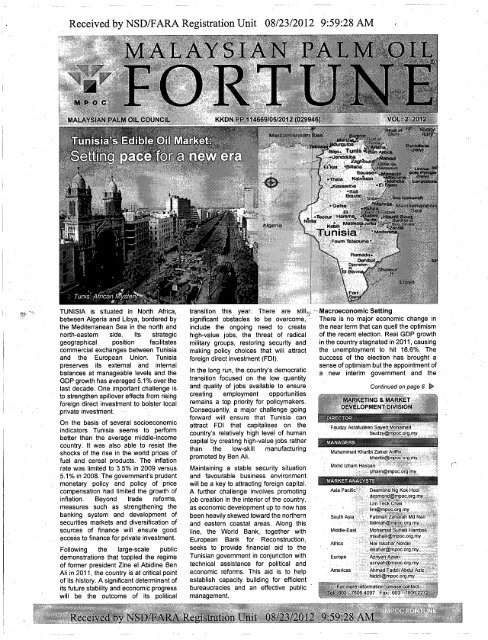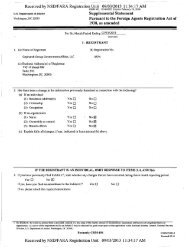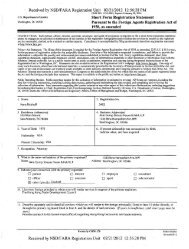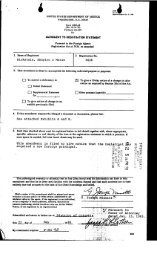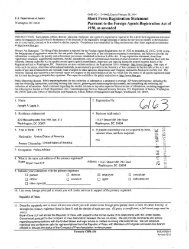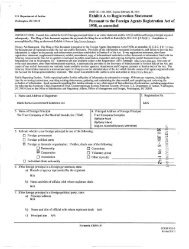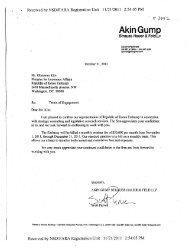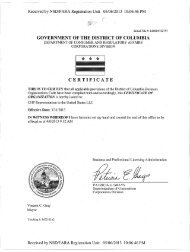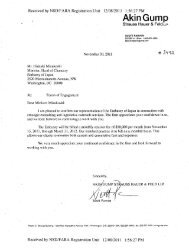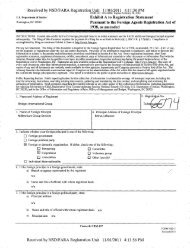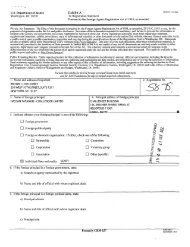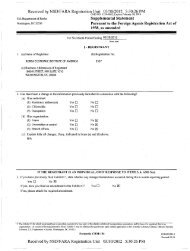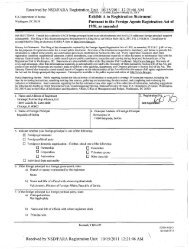Supplemental Statement - FARA
Supplemental Statement - FARA
Supplemental Statement - FARA
You also want an ePaper? Increase the reach of your titles
YUMPU automatically turns print PDFs into web optimized ePapers that Google loves.
Received by NSD/<strong>FARA</strong> Registration Unit 08/23/2012 9:59:28 AM<br />
MALAYSIAN PALM OIL<br />
FORTUNE<br />
MALAYSIAN PALM OIL COUNCIL<br />
M P O C<br />
Jt!ft<br />
Vf.H ' i<br />
1 ^ •<br />
•I 1<br />
i •*J(<br />
TUNISIA is situated in North Africa,<br />
between Algeria and Libya, bordered by<br />
the Mediterranean Sea in the north and<br />
north-eastern side. Its strategic<br />
geographical position facilitates<br />
commercial exchanges between Tunisia<br />
and the European Union. Tunisia<br />
preserves its external and internal<br />
balances at manageable levels and the<br />
GDP growth has averaged 5.1% over the<br />
last decade. One important challenge is<br />
to strengthen spillover effects from rising<br />
foreign direct investment to bolster local<br />
private investment.<br />
On the basis of several socioeconomic<br />
indicators Tunisia seems to perform<br />
better than the average middle-income<br />
country. It was also able to resist the<br />
shocks of the rise in the world prices of<br />
fuel and cereal products. The inflation<br />
rate was limited to 3.5% in 2009 versus<br />
5.1% in 2008. The government's prudent<br />
monetary policy and policy of price<br />
compensation had limited the growth of<br />
inflation. Beyond trade reforms,<br />
measures such as strengthening the<br />
banking system and development of<br />
securities markets and diversification of<br />
sources of finance will ensure good<br />
access to finance for private investment.<br />
Following the large-scale public<br />
demonstrations that toppled the regime<br />
of former president Zine el Abidine Ben<br />
Ali in 2011, the country is at critical point<br />
of its history. A significant determinant of<br />
its future stability and economic progress<br />
will be the outcome of its political<br />
m<br />
KKDN PP 114669/05/2012 (029946) VOL: 2 2012<br />
s> u<br />
transition this year. There are still®<br />
significant obstacles to be overcome,<br />
include the ongoing need to create<br />
high-value jobs, the threat of radical<br />
military groups, restoring security and<br />
making policy choices that will attract<br />
foreign direct investment (FDI).<br />
In the long run, the country's democratic<br />
transition focused on the low quantity<br />
and quality of jobs available to ensure<br />
creating employment opportunities<br />
remains a top priority for policymakers.<br />
Consequently, a major challenge going<br />
forward will ensure that Tunisia can<br />
attract FDI that capitalises on the<br />
country's relatively high level of human<br />
capital by creating high-value jobs rather<br />
than the low-skill manufacturing<br />
promoted by Ben Ali.<br />
Maintaining a stable security situation<br />
and favourable business environment<br />
will be a key to attracting foreign capital.<br />
A further challenge involves promoting<br />
job creation in the interior of the country,<br />
as economic development up to now has<br />
been heavily skewed toward the northern<br />
and eastern coastal areas. Along this<br />
line, the World Bank, together with<br />
European Bank for Reconstruction,<br />
seeks to provide financial aid to the<br />
Tunisian government in conjunction with<br />
technical assistance for political and<br />
economic reforms. This aid is to help<br />
establish capacity building for efficient<br />
bureaucracies and an effective public<br />
management.<br />
• in ;• 1 uni'j *\n. •.«.. ,.,<br />
•\ ,! .' . ••...! .-•<br />
l' * 1.1 i-'l<br />
' > iV -i • • • •• i<br />
• .1. J- •••••:=-.•• «•>!<br />
mlfu.. ,i M '•' W!<br />
••/_!•»'.I L*j ..-Ml..: j<br />
• l • i-i •<br />
•.I'^I r.i i .|. i<br />
Tunisia<br />
Macroeconomic Setting<br />
There is no major economic change in<br />
the near term that can quell the optimism<br />
of the recent election. Real GDP growth<br />
in the country stagnated in 2011, causing<br />
the unemployment to hit 18.6%. The<br />
success of the election has brought a<br />
sense of optimism but the appointment of<br />
a new interim government and the<br />
Continued on page 6 t><br />
MARKETING & MARKET 1<br />
DEVELOPMENT DIVISION<br />
Faudzy Asrafudeen Sayed Mohamed<br />
faudzy@mpoc.org.my<br />
Muhammad Kharibl Zalnal Ariffin<br />
kharibi@mpoc.org.my<br />
Mohd Izham Hassan<br />
izham@mpoc.org.my<br />
|«RKEf!«NAB'STSl<br />
Asia Pacific<br />
South Asia<br />
RLveiwil h\ \SI) I \RA KcuiMratum I nil OS 2} 2012 9:59:28 AM<br />
Europe<br />
Desmond Ng Kok Hooi<br />
desmond@mpoc.org.my<br />
Lim Teck Chaii<br />
lim@mpoc.org.my<br />
Fatimah Zaharah Md Nan<br />
fatimah@mpoc.org.my<br />
Mohamad Suhaili Hambali<br />
msuhaili@mpoc.org.my<br />
Nor Iskahar Nordin<br />
iskahar@mpoc.org.my<br />
Azriyah Azianazriyah@mpoc.org.<br />
my<br />
Ahmad Fadzli Abdul Aziz<br />
fadzli@mpoc.org.my<br />
r in mora information, please contact :


